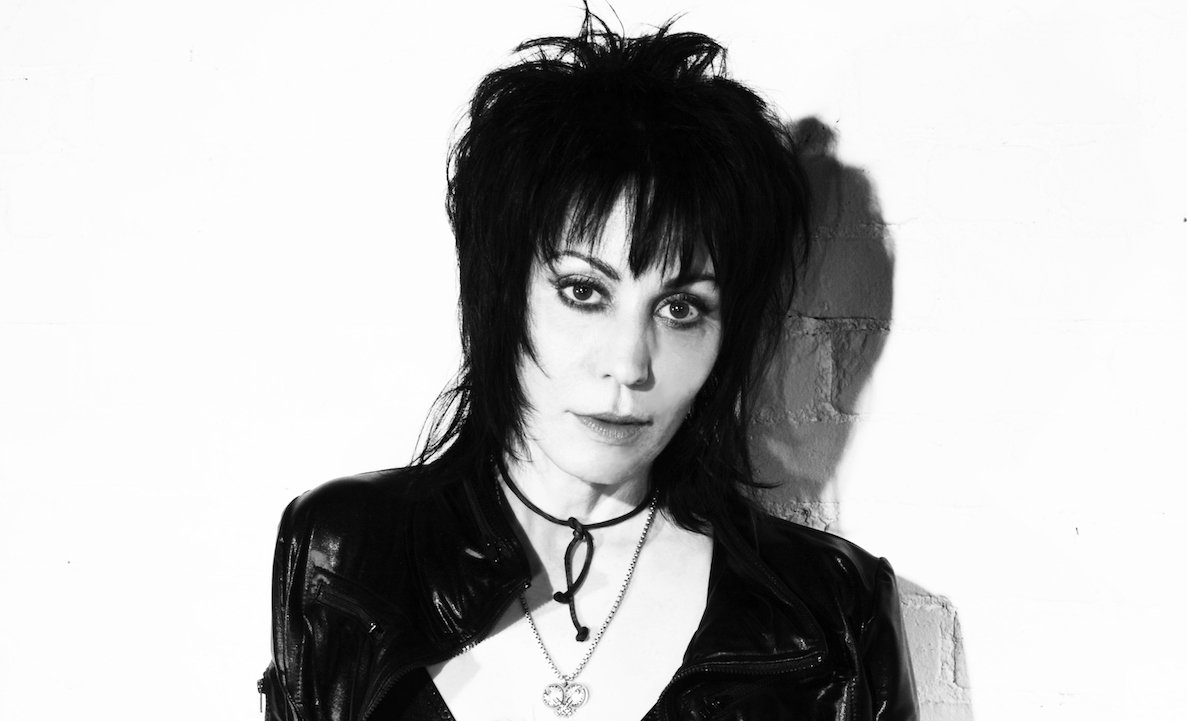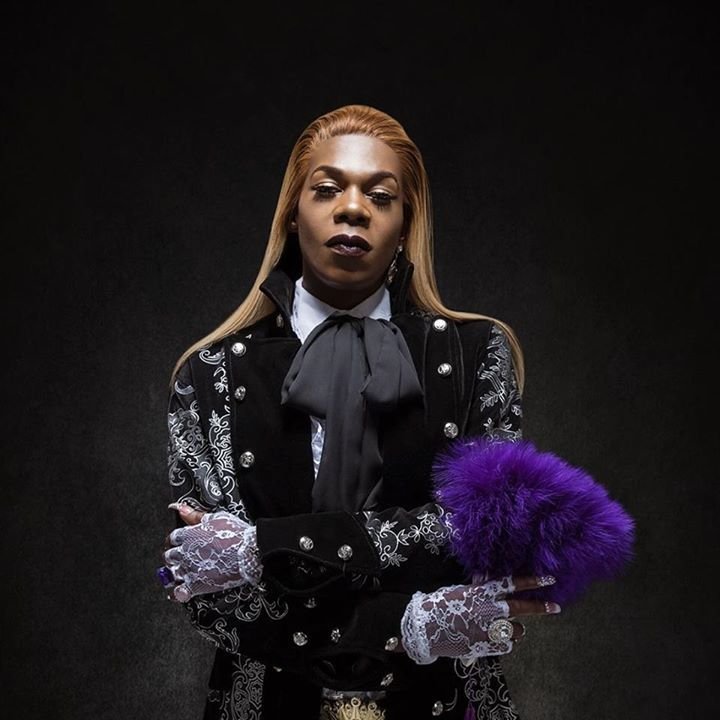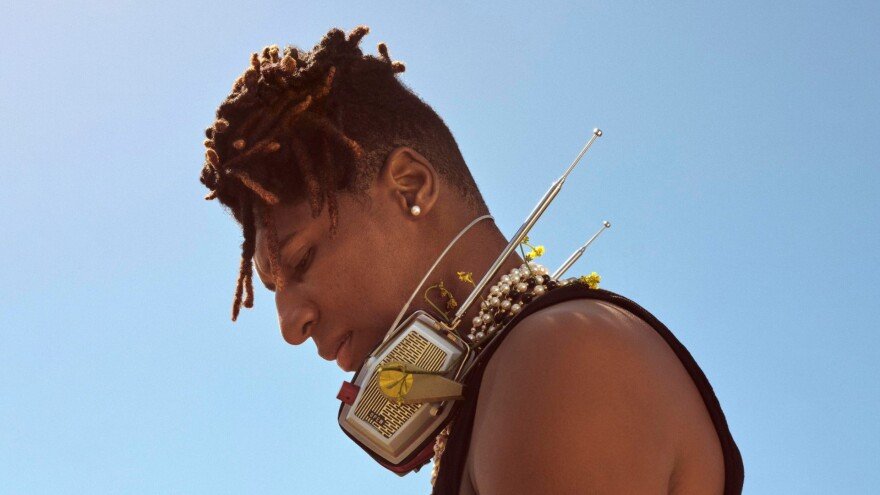Joan Jett Loves Rock 'n' Roll at Jazz Fest

Joan Jett, by Roger Erickson
Joan Jett really does love rock ’n’ roll. That’s not just an attempt to be clever, but in a Lou Reed “Her life was saved by rock ‘n’ roll” way. At Jazz Fest on Friday afternoon, she showed it. That love was the through line, not simply because she played it but because it answered questions and muted doubts.
Early on, for example, she played her version of Gary Glitter’s “Do You Want to Touch Me,” and the lyrics of the song from 1973 haven’t aged well. They’re worse if you know about Glitter’s legal history, but for Jett, the simple, clear power of a heavy guitar riff and a catchy sing-along part answers all questions.
And she did rock with the same, singleminded clarity that she has displayed in her solo career since Bad Reputation in 1979. She committed to the power of the riff, whether on a favorite like “Light of Day” or “I Hate Myself for Loving You” or a number of newer songs that were fine but less distinguished.
Despite minimal stage patter, Jett made it easy to understand her. She has defined herself as someone who does things her way, including reading lyrics off of sheets attached to a music stand with binder clips. Since there are other, less awkward ways to have lyrics onhand, it felt like a specific choice.
She doesn’t do nuance either. The Blackhearts have always been a no frills rock band, as direct as a heart punch, and she sang The Replacements’ “Androgynous” because she has been considered androgynous. She covered “Everyday People” because she considers herself to be everyday people. She did “Fake Friends” to remember the record executives that abandoned her once the hits stopped coming.
In another act, these might sound like negative traits, but for Jett they come together as a tool kit that helped an underdog survive this long in the business. When she started, The Runaways were dismissed as a joke, and even their manager/creator Kim Fowley seemed to be against them much of the time. When she started her solo career, nobody wanted to sign Jett. Kenny Laguna, the sole original Blackheart on stage, explained that they made the first record themselves, sold it themselves, and created a level of success that attracted the labels.
She started the show with a playing of Bikini Kill’s “Rebel Girl,” and while nothing else in the set explicitly foregrounded Jett’s feminist bona fides, her presence on the stage and obvious independence made that statement clearly. She let the rock ’n’ roll do the talking.
I’m still processing Hurray for the Riff Raff’s set on the Shell Gentilly Stage before Jett. Their set was powerful not in volume or speed but in degree of simpatico with Alynda Segarra’s songs. The band’s performances sounded like the natural extension of what Segarra sang and played on their acoustic guitar, and if they weren’t there, that music couldn’t exist. And in the case of “Rhododendron,” the song did move with the relentless energy and rhythm of a subway train.
The idea I’m playing with is the connection between Hurray for the Riff Raff and another generation of singer/songwriters working in a folk/rock combo mode, the artists dubbed by the press as “the new Dylans” in the early 1970s. John Prince and Bruce Springsteen were thought of as new Dylans, and so were New York artists Garland Jeffreys and Elliot Murphy. Is that a useful way to think about Segarra? Are they a new Dylan? The thought didn’t feel like an overreach during the set.
Saturday’s Highlights
For Pearl Jam (5 p.m., Festival Stage) fans, Jazz Fest is a deal. The cheap seats on other stops on their summer tour cost hundreds of dollars on the secondary market.
If Laufey (5:45 p.m., Shell Gentilly Stage) didn’t have a resumé that included outdoor shows and festivals including Lollapalooza last year, I’d wonder if her singer/songwriter-inflected jazz would translate to a Jazz Fest stage.
My priorities in that final slot on Saturday will be the Nigerian R&B singer Tems (6 p.m., Congo Square Stage) in part because I’ve never heard of her but like what I’ve heard since she was announced, and Americana singer Margo Price (1 p.m., Allison Miner Music Heritage Stage; 5:25 p.m., Sheraton New Orleans Fais Do-Do Stage), whose albums present her in active dialogue with her life. I appreciate the way she marries Nashville to Southern California in the ‘70s, so you can hear the Fleetwood Mac and Tom Petty in her record collection.
For more previews of Thursday at Jazz Fest, check our preview of this year’s international acts from Mexico. Recently, I interviewed Son Rompe Pera (11:20 p.m., Festival Stage; 2:40 p.m., Expedia Cultural Exchange Pavilion Stage), and I look forward to Mexican Institute of Sound (1:35 p.m., Congo Square Stage; 4 p.m., Expedia Cultural Exchange Pavilion Stage), the brainchild of producer/DJ Camilo Lara. It creates dance floor-friendly, electronic pop from cumbias and traditional musical starting places.
I also wrote an essay that used the experiences of women playing Jazz Fest to draw attention to the excellent book How Women Made Music: A Revolutionary History by NPR Music, edited by Alison Fensterstock. In it, I spend some time on Margo Price and imagine a Jazz Fest that only featured women artists. It wasn’t hard to do.
Ha-Sizzle “The King of Bounce” (4:20 p.m., Congo Square Stage) is amazing on the most basic levels. His energy might be tested by the late spring heat and Judgment-of-God sun on the Congo Square Stage, but my bet’s on him. Normally he looks and sounds like he could go as long as there’s someone in the club. He can make mouth noises and vocalisms at breathtaking speeds, and once you’ve recognized that, you notice how musically he does it.
Nicholas Payton (4:20 p.m., WWOZ Jazz Tent) commits. Since 2013 when he identified #BAM–Black American Music–as his genre, he has flourished in that wide-open musical space. Hip-hop and DJs in particular have factored into his sound, and when he performs this year, he’ll be joined by singer Triune and drummer/DJ Karriem Riggins, who has also produced Common, The Roots, Talib Kweli and more.
When Riggins, Payton and bassist Ron Carter released Smoke Sessions in 2021, Riggins and Tomoki Sanders reworked four tracks for the Smoke Sessions [Remixed] EP. At the same time, nothing there or on Payton’s 2017 Afro-Caribbean Mixtape sells out the influences that got Payton in the game in the first place.
For more on today at the Fair Grounds, visit My Spilt Milk at Jazz Fest 2025, our complete guide to the festival including archival articles relevant to Saturday and every day at Jazz Fest. There’s a link to an excellent interview with Nicholas Payton, for instance.
Creator of My Spilt Milk and its spin-off Christmas music website and podcast, TwelveSongsOfChristmas.com.






